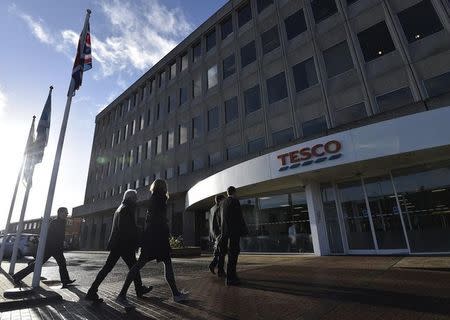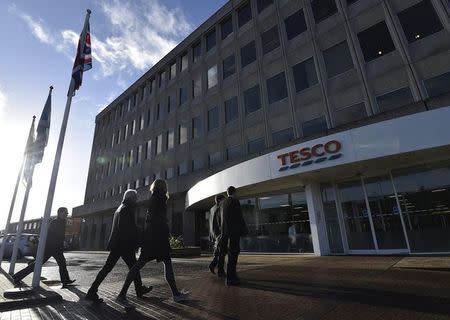Tesco turnaround gathers pace under new CEO
LONDON (Reuters) - Britain's Tesco posted its strongest sales performance in 18 months, industry data showed on Tuesday, adding to evidence that new boss Dave Lewis's turnaround plan is making an impact as a supermarket price war intensifies.
Since joining the troubled grocer last September, Lewis has cut prices on fresh produce and branded goods, improved product availability and stepped up customer service, seeking to win back shoppers who deserted Britain's biggest supermarket chain for discounters Aldi [ALDIEI.UL] and Lidl [LIDUK.UL].
Data from market researcher Kantar Worldpanel showed that Tesco's sales rose 1.1 percent over the 12 weeks to March 1, suggesting that Lewis's plan may be working.
The increase helped Tesco to arrest its falling market share, which was down only a tenth of a percentage point to 28.7 percent compared with last year.
Shares in Tesco are down a quarter year on year but are up 37 percent over the past three months on recovery hopes. They were flat on Tuesday.
Though Aldi and Lidl recorded sales increases of 19.3 percent and 13.6 percent respectively, their growth has been slowing in recent months.
Kantar said that Tesco's resurgence has had an impact on Asda, Britain's second-biggest supermarket chain, which competes for many of the same shoppers as Tesco. Asda sales fell 2.1 percent, taking its market share down half a percentage point to 17 percent.
Last month Asda, the British arm of U.S. group Wal-Mart , blamed a fall in its sales on the unprecedented use of discount vouchers by its rivals among the so-called Big Four grocers and warned that the practice was unsustainable.
Sales at Sainsbury's and Morrisons , the third and fourth-biggest players, fell 0.5 percent and 0.4 percent respectively.
Last month's Kantar data had showed Tesco increasing its sales for the first time since January 2014.
Kantar said that the overall grocery market increased sales by 1.1 percent in the 12-week period, while deflation reached a new low of minus 1.6 percent as price competition between the rivals continued.
"All of the major supermarkets are cutting prices to win shoppers, especially within everyday staples such as eggs, vegetables and milk," said Fraser McKevitt, head of retail and consumer insight at Kantar Worldpanel.
He noted that a combination of lower general inflation and the grocery price war had saved shoppers 400 million pounds in the past 12 weeks.
(Reporting by James Davey; Editing by Neil Maidment and David Goodman)





